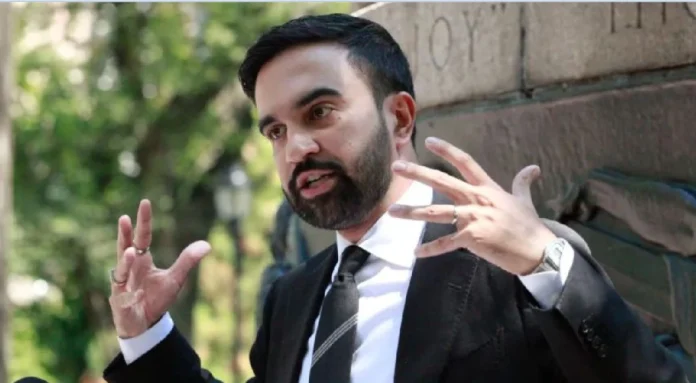By Kenneth Tiven
Improbable: Euphoria in 1969 when the underdog New York Mets baseball team won the World Series.
Improbable: Donald Trump’s improbable quest to become president in 2016.
Improbable: A politician born in Uganda to Indian parents on the verge of becoming Mayor of New York City.
Zohran Mamdani’s rise has upended expectations. After his commanding primary victory, the Democratic Socialist, who champions a fairer, more equitable city, now leads in every major poll. His style exudes the right mix of confidence and connection. His supporters cheer his grassroots energy, but the Democratic establishment remained largely silent—until recently.
Improbable: President Donald Trump is endorsing Andrew Cuomo, the former governor of New York, now running as an independent after being trounced by Mamdani in the Democratic primary.
Mamdani’s campaign, focused on economic justice, housing, and social equity, struck a nerve among voters, but unsettled establishment Democrats. New York Governor Kathy Hochul broke ranks to endorse Mamdani, writing in a New York Times op-ed: “We’ve had disagreements, but I heard a leader who shares my commitment to a New York where children can grow up safe in their neighbourhoods and where opportunity is within reach for every family.”
Senator Chris Van Hollen from Maryland followed suit, criticizing Democratic leaders for allowing Trump to exploit internal divisions: “That kind of spineless politics is what people are sick of. They need to get behind him and get behind him now.”
Meanwhile, political observers ask: Where are Chuck Schumer and Hakeem Jeffries, New Yorkers who lead Democrats in Congress?
Improbable: Michael Bloomberg’s first mayoral run in 2001 was dismissed as a vanity project, yet the businessman’s acumen became indispensable after 9/11, allowing him three terms in office. He stabilized a city in crisis, but his legacy is mixed.
Improbable: The terrorist attacks of 9/11 changed the city forever, and suddenly Bloomberg was seen as the most qualified leader.
Now, Mamdani stands as the improbable candidate who represents a new school of politics—engaged, authentic, and unafraid of directly addressing voters. Unlike Cuomo, whose age and traditional style make him seem out of touch, Mamdani connects intuitively with a younger generation reliant on smartphones and social media. His campaign themes—affordable food, housing, transportation—speak directly to voters under 40.
He listens. He engages. He never appears rushed or bored. His ability to make real connections challenges the typical detached politicking of establishment figures. His campaign also exposes the Democrats’ failure to make policy and performance inspiring in the digital age.
What sets Mamdani apart? An effortless presence in front of the camera—perhaps a gift from his mother, Mira Nair, the acclaimed filmmaker of Monsoon Wedding and The Namesake, and his father, Professor Mahmood Mamdani, a respected political thinker in Uganda.
Running for mayor of an eight-million strong city has never been simple. In the last decade, Democrats lost Congressional ground in New York, most notably when George Santos—later expelled for fraud—briefly seized a Queens district.
The anti-Trump sentiment is palpable. New Yorkers are not surprised that the current president acts like an old mafia boss. His decades-long ties with the mob world of New York construction, and his mentor Roy Cohn, forged a politics of malevolence.
Mamdani’s savvy campaign, however, demonstrates a mastery of today’s political communications. Economist Paul Krugman recently noted: “He’s talking about stabilizing stuff that’s already rent-controlled. It’s policy at the margin… not likely to affect housing construction much. It’s not really that different from the way NYC has been governed… The resilience of New York City has been amazing.”
On the human side, Ajifanta Marenah, vice-president of the Muslim Democratic Club of New York, said: “Zohran resonates with us. We want a government that represents working people, low-income people. A government that’s going to fight for housing, justice, and immigration… We don’t want a mayor that’s only going to work to represent billionaires.”
At a Brooklyn College event, Mamdani shared the stage with Senator Bernie Sanders to a standing ovation. Mamdani attacked capitalist greed, saying: “New York City is not for sale to Donald Trump’s billionaires… not for sale to corporations… not for sale to corrupt politicians.”
Sanders praised Mamdani’s campaign: “It is not ugly 30-second TV ads. It is a grassroots movement… a test case of whether democracy is still able to prevail.” “They are afraid of Mamdani becoming an example of what can happen across the country. They are scared to death… What we are here tonight to say is: To hell with you. We are going to take you on!”
When pressed about Trump’s threat to send National Guard troops to NYC, Mamdani said: “The first thing is we have to prepare for the inevitability of that deployment. We cannot delude ourselves into thinking that because something is illegal, Donald Trump will not do it. Partnership is critical. Imagine Cuomo working together with New York’s Attorney General to fight deployment? Why would he push back when Trump is helping him get elected?” Sanders reflected: “They have wealth. They have the power. You know what we have? We have the people.”
—The writer has worked in senior positions at The Washington Post, NBC, ABC and CNN and also consults for several Indian channels


